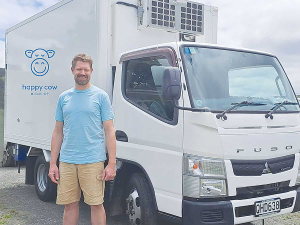Milk factory 'in a box'
A pioneer in small, local, low environmental-footprint milk supply hopes to have his "milk factory in a box" up and running and selling milk to the public by early November.
 Glen Herud’s Happy Cow brand now exists as a ‘factory in a box’ pasteurisation and refrigeration plant. Photo Credit: Happy Cow Facebook Page.
Glen Herud’s Happy Cow brand now exists as a ‘factory in a box’ pasteurisation and refrigeration plant. Photo Credit: Happy Cow Facebook Page.
A Canterbury man who has been working for several years to establish what he calls "a more caring, kinder and fairer" dairy system is now up and running in the North Island after establishing a partnership with a Waikato dairy farm.
Glen Herud's Happy Cow brand has gone through several iterations but now exists as a 'factory in a box' pasteurisation and refrigeration plant, supplying Auckland consumers by way of about a dozen collection points dotted around cafes, convenience stores and the like.
The plant is installed on a Te Kauwhata dairy farm where the farmer has devoted a small number of cows from his main herd to supplying Herud's system.
"You can only buy our milk online through our website. And then we drop it off at several collection points about Auckland and people just go and pick up their milk. And then their credit card is charged," explains Herud.
"We're not going through retailers or anything like that."
Herud says it is not just about how the cows and calves are treated but the partner farmers have to be customer-focused.
"A lot of farmers just want to produce the milk and have it taken away.
"When you start selling milk direct you must start producing really good quality milk and whatever Fonterra calls good quality is still not really what we call good quality. There's a little bit of extra work involved."
Herud says his partner is a sharemilker who is "pretty onboard with what we are doing".
"We'll take more and more as we grow but we'll probably only ever take 50% of their milk."
Herud first featured in the pages of Dairy News in 2016 when he was milking his own small herd near Christchurch using a 15-metre custom trailer housing a milking machine, pasteuriser and bottling plant, and serving a small customer base including cafes and supermarkets. He also won an environmental award for the way the mobile plant could be taken to where the cows graze, to minimise pugging.
His philosophy also includes animal welfare priorities such as leaving calves with their mothers to wean naturally.
By 2018, however, he had to concede that it was too expensive to operate at small scale and moved to develop his factory-in-a-box model for installation on partner farms.
Herud says he is now building an improved second prototype and hoping to find a Canterbury partner farm.
"We will be back down to Christchurch shortly. That's the plan."
Effective from 1 January 2026, there will be three new grower directors on the board of the Foundation for Arable Research (FAR).
The National Wild Goat Hunting Competition has removed 33,418 wild goats over the past three years.
New Zealand needs a new healthcare model to address rising rates of obesity in rural communities, with the current system leaving many patients unable to access effective treatment or long-term support, warn GPs.
Southland farmers are being urged to put safety first, following a spike in tip offs about risky handling of wind-damaged trees
Third-generation Ashburton dairy farmers TJ and Mark Stewart are no strangers to adapting and evolving.
When American retail giant Cosco came to audit Open Country Dairy’s new butter plant at the Waharoa site and give the green light to supply their American stores, they allowed themselves a week for the exercise.
President Donald Trump’s decision to impose tariffs on imports into the US is doing good things for global trade, according…
Seen a giant cheese roll rolling along Southland’s roads?